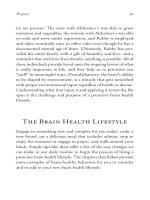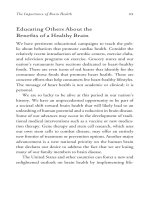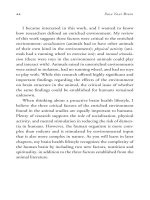Save Your Brain: The 5 Things You Must Do to Keep Your Mind Young and Sharp_15 pot
Bạn đang xem bản rút gọn của tài liệu. Xem và tải ngay bản đầy đủ của tài liệu tại đây (478.24 KB, 15 trang )
Save Your Brain194
for cancer, Alzheimer’s, mental illness, and substance abuse may
indeed be found in a piece of bark deep in the Amazon Jungle.
The cure may just as reasonably be found in the deep gyri of
one brain of the billions of brains on our planet. Remember, it
only takes one brain for something to be considered real or pos-
sible. I have a fundamental belief that the human brain contains
the answers to our greatest diffi culties, our most challenging
questions. The brain is simply too brilliant to not provide us
the roadmaps to different solutions, to make life on Earth a
better experience, and to wipe disabling diseases from our exis-
tence. The brain contains the mathematical wizardry necessary
to create the twenty-second-century world and to appreciate
deeply complex things such as time and aging itself. The brain
seeks pleasure, and its most elegant processing occurs when it
is stimulated using multiple sensory pathways simultaneously.
The brain also contains answers so that all people of different
backgrounds with different sets of beliefs can appreciate more
fully we are one species with more similarity than difference.
Our future holds signifi cant promise for an entirely new
understanding of the human brain. As we develop more sophis-
ticated means of exploring the human brain, we will begin to
close the gap between what we now believe about the human
brain and what is real. We continue to underestimate the power
of the brain because we do not understand it well enough.
There is a basic human tendency to be cautious and dubious,
but I believe we should be aggressive and bold with regard to
the potential of the human brain. The future will provide us
with more insight and a deeper appreciation for how brilliant
the brain is. We will also learn how to use our brains in new and
Pioneering a Bold Future for Brain Health 195
highly effi cient ways and to adapt to life circumstances in ways
that increase our health and longevity. Perhaps we will also
discover within our brain the deep sense of spirituality that has
existed in humans since the beginning of time. We may even
fi nd that the complexities, questions, and answers on the origin
of our universe are the same for the brain. Can something so
brilliant be random?
Until such exploration yields some of these insights, we need
to begin the process of learning about our own brain. From a
basic understanding of your brain, you can understand why a
proactive lifestyle is critical. Personalizing the message of this
book will enable you to engage in a brain health lifestyle across
your entire life span, which is desirable because the goal of main-
taining access to your life story is so meaningful. It is important
to try and refl ect on the many brilliant things you do every day,
the experiences of life, and the social interactions your brain
permits you to experience. We are truly blessed to have such a
complicated and miraculous system within our skull. We are
also so fortunate to have the ability to shape our brains, which
means we have some control over the integrity and indeed the
health of our brain. This is truly a wonderful opportunity for
each of us to engage in the proactive path toward brain health.
You have been encoding experiences most of your life, and your
brain has placed them systematically into a long-term storage
for your use. I refer to this as your autobiography,
your life story,
the most precious gift you have. It is critical that you maintain
access to your life story so you can share it with your next great
generation, the little ones in your life. Get started on your jour-
ney toward brain health today. You have much to share!
Save Your Brain196
A Final Word
Brain health is a critically important and interesting frontier
that has captured the focus of the nation and the world. It is
now up to those of us on the front lines of schools, libraries,
homes, and corporations to introduce and implement brain
health. Everyone who works to learn about their brain and to
make lifestyle changes to promote their own brain health will
benefi t. While change is typically not easy, such lifestyle altera-
tions can be fun and personally relevant. It is time for all of us
to begin a proactive approach to protecting our life stories so
that we can share them with our next great generation of little
ones!
Good luck with your own journey to better brain health!
197
Resources
7
Paul D. Nussbaum, Ph.D.
paulnussbaum.com
412-471-1195
Dr. Nussbaum’s website offers a tremendous amount of friendly
information on the human brain and brain health promotion.
He also provides a series of links to different companies that
he works with and programs and products on brain health.
You can also order Dr. Nussbaum’s books on his brain health
lifestyle and DVDs.
Kathy Rusk, Registered Dietitian
Nutrition Dynamics Northwest
nutritiondynamicsnw.com
425-269-6979
Resources198
Websites
Moxxor Nutritional Supplements
mymoxxor.com/drpaul
The Moxxor website offers great information on nutritional
supplements that can help boost brain health.
Fit Brains
fi tbrains.com
Fit Brains provides fun and friendly brain-fi tness games that
give you a daily brain workout. Fit Brains also provides use-
ful tools to help you get started on a brain health lifestyle. Dr.
Nussbaum serves as the chief scientifi c offi cer to Fitbrains,
Inc.
Emeritus Senior Living
emeritus.com
Emeritus is one of the largest assisted-living companies in
the United States, and it has incorporated Dr. Nussbaum’s
brain health lifestyle into its culture. Dr. Nussbaum works
closely with Emeritus to provide superior programs for resi-
dents in independent-living, assisted-living, and memory-care
situations.
Resources 199
International Center for Leadership in Education
leadered.com
The International Center for Leadership in Education is a lead-
ing authority on education and necessary reforms for improving
the education system in America. Dr. Nussbaum serves ICLE as
a senior advisor for brain health and education, and he provides
keynote presentations to school districts across the country.
Alzheimer’s Prevention
alzprevention.org
The Alzheimer’s Foundation of America provides information
and programs on research-based methods to delay the onset of
Alzheimer’s and related dementias. Dr. Nussbaum serves as the
chair of the Prevention Advisory Board for AFA.
Connected Living
mywayvillage.com
MyWay Village has a unique program called Connected Living
that provides seniors with computer-based methods to tell their
life stories and to remain integrated with family and friends. Dr.
Nussbaum serves as the chief brain health offi cer and provides
leadership to MyWay Village on aspects of brain health and
the importance of socialization as one component to a brain
health lifestyle.
Resources200
American Society on Aging
asaging.org
The American Society on Aging is a leading organization for
education and training in nearly all aspects of aging. Dr. Nuss-
baum has worked with the ASA to provide keynote presenta-
tions on brain health for many years.
Marbles
marblesthebrainstore.com
This new and unique retail chain provides the consumer with
some of the latest products and information dealing with brain
health.
Books on Brain Health
Brizendine, L. The Female Brain. New York: Morgan Road
Books, 2006.
Carper, J.
Your Miracle Brain. New York: Quill, 2001.
Diamond, M.C., & Hopson, J.
Magic Trees of the Mind. New
York: Plume, 1999.
Kotulak, R.
Inside the Brain: Revolutionary Discoveries of How
the Mind Works
. Kansas City, MO: Anreas and McMeely,
1997.
Nussbaum, J.F., Federowicz, M., & Nussbaum, P.D.
Brain
Health and Optimal Engagement in Older Adulthood
. Girona,
Spain: Editorial Aresta, 2009.
Resources 201
Nussbaum, P.D. Brain Health and Wellness. Tarentum, PA:
Word Association Publishing, 2003.
—
. Your Brain Health Lifestyle. Tarentum, PA: Word Asso-
ciation Publishing, 2007.
—
. Your Brain Health Lifestyle: Application to the School,
Library, Corporate and Business Setting, and Home
. 2nd ed.
Tarentum, PA: Word Association Publishing, 2009.
Snowdon, D.A.
Aging with Grace. New York: Bantam Books,
2001.
Snyder, P.J., Nussbaum, P.D., & Robins, D.L.
Clinical Neuro-
psychology: A Pocket Handbook for Assessment.
2nd ed. Wash-
ington, DC: American Psychological Association, 2006.
Research Papers on
Brain Health
Colcombe, S.J., et al. (2006). Aerobic exercise training increases
brain volume in aging humans. The Journal of Gerontology:
Medical Sciences 61:1166–70.
Diamond, M.C., Krech, D., & Rosenzweig, M.R. (1964). The
effects of an enriched environment on the histology of the
rat cerebral cortex.
Journal of Comparative Neurology 123:
111–20.
Eriksson, P.S., Perfi lieva, E., Bjork-Eriksson, T., Alborn, A.M.,
Nordborg, C., Peterson, D.A., & Gage, F.H. (1998). Neu-
Resources202
rogenesis in the adult human hippocampus. Nature Medi-
cine
4:1313–17.
Mortimer, J.A. (1997). Brain reserve and the clinical expression
of Alzheimer’s disease.
Geriatrics 52:S50–S53.
Snowdon, D.A., Kemper, S.J., Mortimer, J.A., Greiner, L.H.,
Wekstein, D.R., & Markesbery, W.R. (1996). Linguistic
ability in early life and cognitive function and Alzheimer’s
disease in late life: Findings from the nun study.
Journal of
the American Medical Association
275:528–32.
Willis, S.L., et al. (2006). Long-term effects of cognitive train-
ing on everyday functional outcomes in older adults. JAMA
296:2805–14.
Additional References
on Nutrition
DHA, A Good Fat. American Dietetic Association Fact Sheet.
Chicago, 2008.
The Human Brain—Fats, Micronutrients, and Proteins. Pub-
lished on the Franklin Institute Resources for Science
Learning website ( />.html, http://www.fi .edu/learn/brain/micro.html, http://
www.fi .edu/learn/brain/proteins.html), 2004.
Omega-3 Fatty Acids, Fish Oil, Alpha-Linolenic Acid. Natural
Standard Patient Monograph, published on the Mayo
Resources 203
Clinic website by the Mayo Foundation for Medical Edu-
cation and Research, June 20, 2008.
Omega-6 Fatty Acids and Risk for Cardiovascular Disease. The
American Heart Association, Harris, W., et al.
Circulation
2009, 119:902–907.
Mahon, K., & Stump, S.E.
Krause’s Food, Nutrition and Diet
Therapy
. W.B. Saunders, 2003.
Schmidt, Michael A.
Brain-Building Nutrition: How Dietary Fats
and Oils Affect Mental, Physical, and Emotional Intelligence
.
3rd ed. Frog Books, Ltd., 2007.
Tribole, E.
The Ultimate Omega-3 Diet. McGraw-Hill, 2007.
This page intentionally left blank
205
Aerobic exercise, 10, 92, 94, 95, 97,
98, 101
Alzheimer’s disease
brain reserve and, 38, 47–48, 105,
112, 190
as cause of dementia, 19–21
memory loss and, 21, 23–24
mental stimulation and, 105, 107,
108, 109, 110
passive lifestyle and, 49
physical activity and, 101, 103
Ambidextrous brain, building an,
95–97
Anatomy, brain
cortex, 32–34
hippocampus, 22–23, 24, 40–41,
45, 72, 114, 129, 130
left and right hemispheres, 35–37,
95, 96
methods for studying, 31–32
neurons, 38–40
subcortex, 35, 52
Annan, Kofi , 78
Antioxidants, 59, 74, 145–46, 148,
153, 159
Artichoke Nut Bread, 177
Axons, 38, 39
Balance, importance of, 128–29
Blackberry Cobbler Rolls, 181
Blueberry Crisp, 183
Blueberry Nut Bread, 180
Brain, human
anatomy, 31–41
life story inside, 3, 26, 195
personalizing brain health, 27–28
unlocking potential of, 189–95
Brain health, critical areas of. See
Critical areas of brain health
Brain health ambassadors, 188
Brain health inventory
as fi rst step, 7–8
mental stimulation domain, 11–12
nutritional domain, 13–14
physical domain, 10
scoring, 14–16
social domain, 9
spiritual domain, 12–13
Brain reserve
Alzheimer’s disease and, 38, 47–48,
105, 112, 190
cortex and, 52
defi ned, 4, 38, 46–47, 72
enhancing, 46–49
novel and complex experiences for,
53–55, 106
Brain-healthy recipes
beef dish, 167
breads and desserts, 177–86
chicken dishes, 170–71
fi sh dishes, 172–76
sauces and dips, 162–66
soups, 160–61
vegetarian dish, 168–69
Breathing exercises, 133
Butternut Squash Soup, 161
Central information processing system,
38
Chicken, Broccoli and Brown Rice
Casserole, 171
Chicken with Mango Salsa, 170
Computers and socialization, 87–88
Corpus callosum, 35, 37, 92
Index
7
Index206
Cortex, 32–34
Cranberry-Orange Bread, 179
Critical areas of brain health
defi ned, 61–63
engaging with, 74–75
inventory of, 7–16
mental stimulation, 71–72, 105–23
nutrition, 73–74, 141–59
overview of, 70–74
physical activity, 71, 91–103
research study on, 63–69
socialization, 70, 77–|89
spirituality, 72–73, 125–39
Curry Cream, Chilled, 164
Dancing, 10, 96, 97, 98, 100, 101
Dementia. See also Alzheimer’s disease
defi ning, 19–21, 23–24, 78
isolation and, 44, 70, 77, 82–83
physical activity and, 94, 96, 103
unhealthy foods and, 143, 145
Dendrites, 38, 39
Diabetes, 57, 58, 143, 145, 149
Diet. See Nutrition
Einstein, Albert, 106
Elderhostel, 111
Emeritus Assisted Living, 64, 198
Executive system, 34
Exercise, physical. See Physical activity
Family and friends
playing board games with, 113–14,
117–18
socializing with, 9, 84
Fish, 13, 142, 144, 150, 152, 158, 159
Fish dishes, 172–76
Fit Brains, 109, 112, 113, 118, 123,
198
Five critical areas of brain health
defi ned, 61–63
engaging with, 74–75
inventory of, 7–16
mental stimulation, 71–72, 105–23
nutrition, 73–74, 141–59
overview of, 70–74
physical activity, 71, 91–103
research study on, 63–69
socialization, 70, 77–89
spirituality, 72–73, 125–39
Frontal lobes, 33–34
Future for brain health, 187–95
Games, 12, 113–14, 117–18
Gardening, 10, 96, 97
Green Peppers, Stuffed, 167
Healthy brain lifestyle
active, conscious behavior, 51–53
changing your lifestyle, 55–58
commitment to, 58–59
novel and complex experiences, 46,
48, 53–55, 57, 77, 106, 114,
116
research on, 63–69
Heart health and brain health, 28, 29,
91–92
Hemispheres, left and right, 35–37,
95, 96
Hippocampus, 22–23, 24, 40–41, 45,
72, 114, 129, 130
Hobbies, 9, 80–81, 88, 121, 123
Hoffman, Dustin, 2
Hummus, 162
Intelligence quotient (IQ), 48, 108,
109, 114
Internet
helpful websites, 197, 198–200
socialization via, 87–88
Inventory, brain health
as fi rst step, 7–8
mental stimulation domain, 11–12
nutritional domain, 13–14
physical domain, 10
scoring, 14–16
social domain, 9
spiritual domain, 12–13
Isolation and dementia, 44, 77,
82–83
Knitting, 10, 96, 97
Language and brain development,
107–8
Left and right hemispheres, 35–37,
95, 96
Lifelong learning, 110–12, 115
Lifestyle. See Healthy brain lifestyle
Loneliness and dementia, 82–83
Index 207
Meditation and prayer
for health and happiness, 126–27
for stress reduction, 129, 131–33
in workplace, 136, 137
Memory loss
Alzheimer’s disease and, 21, 23–24,
40–41
stress and, 22–23, 129–30
types of, 21–24
Mental stimulation
brain reserve and, 105–7
cognitive training, 109–10
enriched environments and, 44
games for, 12, 113–14, 117–18
at home, 117–18
language and brain development,
107–8
lifelong learning, 110–12
music for, 11, 115, 116
neurogenesis and, 71–72
reading and writing for, 11, 114–15,
123
tips and ideas for, 121–22
travel for, 11, 116
in workplace, 118–20
Mental Stimulation Domain of brain
health inventory, 11–12, 16
Micronutrients, 147, 148, 153–54
Moxxor supplements, 155, 198
Music, 11, 115, 116, 138
MyWayVillage, 88, 199
Neurogenesis, 41, 43, 45
Neurons, 38–40
Neurotheology, 73, 126, 127
Novel and complex experiences, 46, 48,
53–55, 57, 77, 106, 114, 116
Nutrition. See also Recipes
antioxidants, 59, 74, 145–46, 148,
153, 159
carbohydrates, 147, 148–49
fats, 142–43, 148, 151
at home, 156
ideas for promoting, 158–59
importance of, 141
micronutrients, 147, 148, 153–54
omega-3 fatty acids, 59, 74, 143,
148, 150, 151, 152, 154, 155,
159
protein, 147–48, 150–51
supplements, 154–55
in workplace, 157
Nutritional Domain of brain health
inventory, 13–14, 16
Nuts, 14, 142, 144, 149, 151, 152,
153, 158, 159
Occipital lobes, 33, 34
Omega-3 fatty acids, 59, 74, 143, 148,
150, 151, 152, 154, 155, 159
Parietal lobes, 33, 34, 127
Passions and talents, sharing, 81–82, 88
Peaches with Raspberry Sauce,
Poached, 185–86
Peanut Sauce, 165
Pedometers, 94, 95, 98, 99, 101, 103
Physical activity
ambidextrous brain and, 95–97
enriched environments and, 44
heart health and brain health, 91–92
at home, 97–98
ideas and tips, 102, 103
walking, 10, 92–94, 97, 98, 99–100,
101, 103
in workplace, 99–100
Physical Domain of brain health
inventory, 10, 16
Pineapple Upside-Down Cake, 182
Pizza, Smoked Salmon, 174–75
Plasticity, 24, 38, 42–43, 45, 46, 93,
189, 190
Post-traumatic stress disorder (PTSD),
130
Prayer and meditation
for good health, 126–27
for stress reduction, 129, 131–33
in workplace, 136, 137
Pumpkin Bread, 178
Rain Man, 2
Reading and writing, 11, 114–15, 123
Recipes, brain-healthy
beef dish, 167
breads and desserts, 177–86
chicken dishes, 170–71
fi sh dishes, 172–76
sauces and dips, 162–66
soups, 160–61
vegetarian dish, 168–69
Index208
Rémoulade Sauce, 166
Research on
brain health lifestyle, 63–69
environment and brain health,
43–49
walking, 92–94
Retirement, health risk of, 70, 78–81
Rusk, Kathy, 146
Salmon, 13, 142, 150, 152, 159
Salmon Burgers, 173
Salmon Pizza, Smoked, 174–75
Salmon Rama, 172
Salmon Rémoulade Salad, 176
Sign language, 11, 108
Sleep, 12, 21, 23, 139
Snowdon, D. A., 107
Social Domain of brain health
inventory, 9, 16
Socialization
in community organizations, 81–82,
87
dementia and isolation, 44, 77,
82–83
enriched environments and, 44
at home, 84–85
ideas to promote, 86–87
quick review of tips on, 88
retirement and, 70, 78–81
in workplace, 85–86
Spiritual Domain of brain health
inventory, 12–13, 16
Spirituality
balance and, 128–29
defi ned, 72–73, 125
God and brain, 127
at home, 134–36
meditation and prayer, 126–27,
129, 131–33
tips for promoting, 137–38
in workplace, 136–37
Stress
importance of balance, 128–29
indicators, 133–34
meditation for reducing, 126–27,
129, 131–33
memory loss and, 22–23, 129–30
Stuffed Green Peppers, 167
Subcortex, 35, 52
Synapses, 38, 43
Synaptic density, 47
Television viewing, 49, 84
Temporal lobes, 33, 34, 127
Tomato Soup with Basil, 160
Travel, 11, 102, 116
Vegetarian Dutch Baby, 168–69
Walking, 10, 92–94, 97, 98, 99–100,
101, 103
Websites, helpful, 197, 198–200
Willis, Sherry, 110
Workplace
mental stimulation in, 118–20
nutrition in, 157
physical activity in, 99–100
socialization in, 85–86
spirituality in, 136–37
Yogurt Smoothie with Fruit, 184
Yogurt-Herb Dipping Sauce, 163









